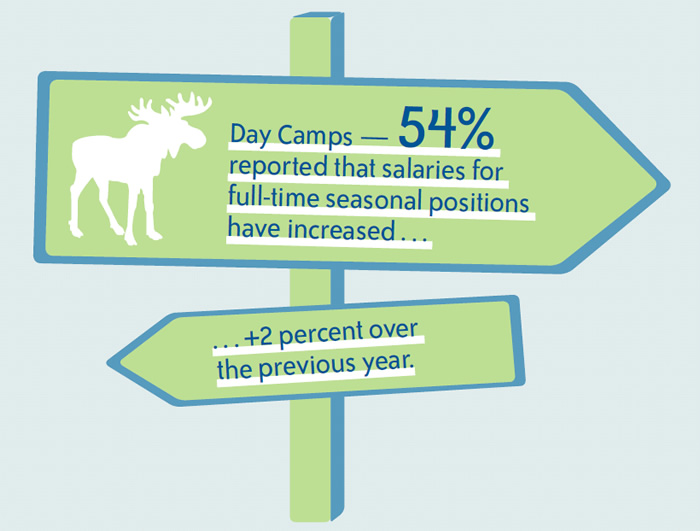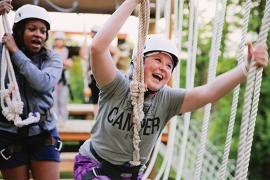On the job front, national employment reports are generally coming in positive, with some indication that salaries, wages, and benefits may be rising a little (see, for example, www.bls.gov). So how is this playing out in the camp industry? The American Camp Association’s 2016 Compensation, Benefits, and Professional Development Survey provides some insight.
Following are several highlights of the type of information that can be found in the report on survey results. Camp director profiles (selected from key administrative professional staff that included camp director, assistant director, maintenance director, food services director, and registrar/office assistant) are presented along with any changes in salaries that have occurred over the past year, as well as projected changes for the upcoming year. The key seasonal positions of camp counselor, lifeguard, and camp nurse, selected from over 20 seasonal staff positions, are also discussed, as are recent proposed changes to minimum wage laws and where to find information pertinent to your specific camp.
Camps in the Sample
Survey results are based on answers provided by 427 respondents from a stratified random sample of ACA camps: 172 primarily targeted the overnight camp audience, 198 primarily targeted the day camp audience, and 57 respondents primarily targeted rental groups such as schools, conferences, etc. The focus here is primarily on overnight camps and day camps.
Salaries and Benefits
Camp Director Profiles and Changes in Salary
Camps identifying as primarily overnight reported a majority of camp directors are male and most are Caucasian. Fifty-seven percent of overnight camps reported an increase in salary for camp directors compared to the previous year, and 62 percent of camps anticipate at least a 2-percent salary increase for camp directors in the coming year.
When comparing salaries, the median is often considered a better indicator of a typical salary due to the influence that extremely high or low salaries exert on the average.
| Overnight Camp Director Profile | |
|---|---|
| Gender | 56 percent male |
| Age | Average age of 45 years |
| Ethnicity | 92 percent Caucasian or white 3 percent African American or black 1 percent Hispanic 1 percent Asian or Pacific Islander |
| Education | 50 percent have a bachelor’s degree 40 percent have a master’s degree |
| Tenure at Camp | Average tenure of 15 years |
| Salary | Median salary: $54,600; average salary: $74,400 |
Day camp directors tended to be a little younger and a little more diverse. Fifty-five percent of day camps reported an increase of at least 3.4 percent in salary compared to the previous year, and 59 percent of day camps anticipate an average increase of 2 percent in the coming year
| Day Camp Director Profile | |
|---|---|
| Gender | 54 percent female |
| Age | Average age of 41 years |
| Ethnicity |
80 percent Caucasian or white |
| Education | 59 percent have a bachelor’s degree 31 percent have a master’s degree |
| Tenure at Camp | Average tenure of 11 years |
| Salary | Median salary: $45,000; average salary: $56,800 |
Top Seasonal Position Salaries
Almost 70 percent of overnight camps reported that salaries for full-time seasonal positions have increased over the previous year at an average rate of +2.6 percent. Counselors, lifeguards, and nurses have been selected here for illustrative purposes from over 20 seasonal staff positions typically found at camp. The median weekly wage for each position is as follows (table top right):
There were significant differences for nurses’ weekly salaries in overnight camps across camp ownership/sponsorship: agency, $500; religious, $535; independent not-for-profit, $975; and for-profit, $800.
Within day camps, 54 percent reported that salaries for full-time seasonal positions have increased +2 percent over the previous year. The median weekly wages are (table below right):
Similar to overnight camps, there were significant differences for nurses’ weekly salaries in day camps across camp ownership/sponsorship: agency, $700; religious, $637; independent non-profit, $971; for-profit, $500.
Benefits
Agency camps provided the highest percentage of their full-time, year-round employees with health insurance (91 percent of overnight camp employees), while for-profit camps provided the highest percentage of year-round, part-time employees with health insurance (21 percent of overnight camp employees).
Other benefits included in the results are bonuses or incentive pay, retirement contributions, dental insurance, housing, life insurance, sick days and vacation, and professional development. The median cash value of benefits at both day and overnight camps ranges from $10,000 to $15,000.
| Staff Position | Overnight Median Weekly Salary |
|---|---|
| Counselors | $240 |
| Lifeguards | $250 |
| Nurse | $689 |
| Staff Position | Day Median Weekly Salary |
|---|---|
| Counselors | $330 |
| Lifeguards | $370 |
| Nurse | $626 |

Minimum Wage and Overtime
Day camps and overnight camps report drastically different percentages of full-time, seasonal staff that are covered by overtime and minimum wage provisions under their state’s labor laws. At the average day camp, 34 percent of full-time, seasonal staff are thought to be exempt from minimum wage and overtime provisions, while at the average overnight camp 74 percent of full-time, seasonal staff are thought to be exempt.
To get a better understanding of this complex issue, and to learn which employees qualify for exemptions from minimum wage and overtime provisions, ACA has developed an online resource. For details on federal exemptions from the Fair Labor Standards Act and state wage laws that may be more stringent, visit: ACAcamps.org/resource-library/public-policy/fair-labor-standards-act-applicability-camps.
The 2016 Compensation, Benefits, and Professional Development Survey provided detailed information from many camps across the country. In the full results report available from ACA, data can be evaluated across characteristics such as camp ownership/sponsorship, camp type, region of the country, and gross revenue size, as well as across individual characteristics of people in leadership positions such as gender, age, education, and tenure at camp. Full reports for overnight camps, day camps, or both are available.
Troy Bennett is a graduate research assistant for the American Camp Association.


